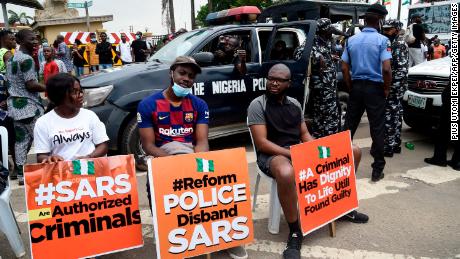There are no products in your shopping cart.
| 0 Items | £0.00 |


NIGERIA'S National Economic Council (NEC) has succumbed to ongoing pressure from ongoing protesters demanding the scrapping of the Special Anti-Robbery Squad (Sars) and set up panels of enquiry to investigate all cases of police brutality and extra-judicial killings.
Over the last fortnight, there have been widespread demonstrations across Nigeria and in the diaspora to protest the recent brutal killings of Sars forces. Last weekend, Sars operatives killed a young boy identified as Joshua Ambrose in cold blood in Delta State but unfortunately for them, videographer Prince Nicholas Makolomi, recorded the whole incident live.
His video fuelled anger across Nigeria, sparking off a series of nationwide protests, with celebrities joining in with an online campaign across social media. So fierce has been the public mood that the inspector-general of police Mohammed Adamu has been forced to announce the dissolution of the Sars unit.
Rocked by the scale of the protests, the federal government has now been forced to act and meet some of the demands of the protesters. Yesterday, the NEC, presided over by vice president Professor Yemi Osinbajo, held its monthly meeting in Abuja and ordered the immediate establishment of state-based judicial panels of inquiry across the country to receive and investigate complaints of police brutality or related extra judicial killings with a view to delivering justice for all victims of the dissolved Sars and other police units.
In addition, the NEC resolved that state governors and the Federal Capital Territory (FCT) minister should take charge of interface and contact with the protesters in their respective domains. At a meeting attended by state governors, the judicial panels which would be set up in all the states would include representatives of youths, students, civil society organisations and would be chaired by a respected retired state high court judge.
Furthermore, the council also directed that state governors should immediately establish a state-based special security and human rights committee to be chaired by the governors to supervise the newly formed police tactical units and all other security agencies located in the state. The idea of the special security and human rights committee in all states of the federation and the FCT is to ensure that police formations and other security agencies consistently protect the human rights of citizens.
Members of the special committee would also include representatives of youths, and civil society and the head of police tactical units in each of the states would also be a member of the committee. It was also agreed that the panels' assignment should be concluded within a maximum of six months, unless there are any convincing reasons why the state governor should allow an extension.
There would also be human rights public complaints teams of between two to three persons to receive complaints on an ongoing basis. It was resolved that each state government shall also set up such a complaints office to which members of the public can relate by telephone or social media channels.
It shall be the duty of the officers of the complaints office to liaise with the leadership of security agencies, attempt resolution of complaints or otherwise guide the complainants. Also the NEC directed all state governors to immediately establish a victims fund to enable the payment of monetary compensation to deserving victims.